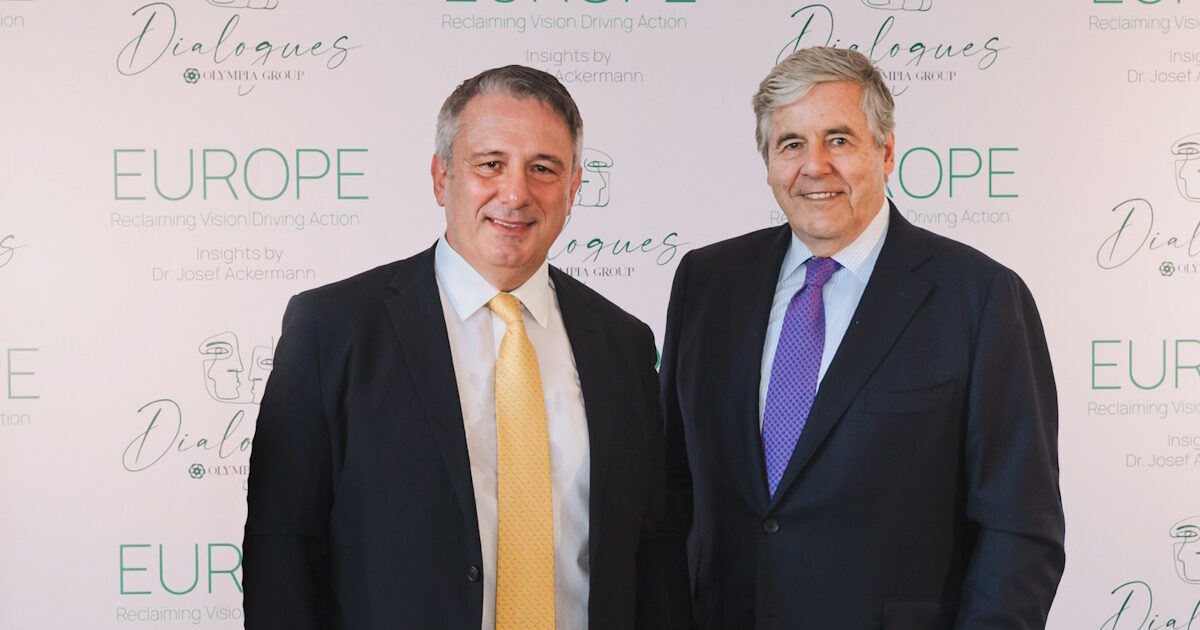OR Europe They are facing significant challenges and all parties are called upon to make difficult decisions, because the focus of the European Union and the Eurozone itself is at the center. This was the central conclusion of the Olympia Dialogues event “Europe: Reclaiming Vision, Driving Action” held today (10.6.2025) by the Group Olympia At the Zappeion Palace with a keynote speaker, Dr. Josef Ackermann and the participation of the Vice -President of the Government, Mr. Kostis Chatzidakis, the President of the Hellenic Bank Association, Mr. Gika Chardouvelis and the Managing Director of Olympia Group, Mr. Andreas Athanasopoulos.
“We are in a new era of turmoil, a new order of things is being created. Old practices are abandoned and old alliances are abolished, and new ones are formed, “he said. Ackermann making a special reference to Russia’s attack on Ukraine that brought the war to Europe again after 80 years, but also to the policy pursued by US President Donald Trump, according to a statement by the Olympia Group.
“President Trump wants to make the US a little more like China,” said former head of Deutsche Bank and one of the most well -known personalities in the international financial industry, as competition with China is at the top of the American agenda. “The restriction of China is an absolute priority. The treatment of Russian imperialism is secondary, “he said. ACKERMANN, stressing that the increase in defense spending on NATO countries to 5% is the new given.
In the face of these developments, the European Union has two options still said Dr. Ackermann. “The first option is to follow another superpower as it has done all these years in the US military field. The second option is to develop its strategic autonomy, militarily against Russia, financially against China and politically towards the US, “he said.
Drivers of what the European Union should do are Enricco Letta’s reports on the single European market and Mario Draghi on EU competitiveness. “Especially the Draghi report clearly describes the existential risks facing the European venture and what needs to be done,” said Dr. Akermann, however, noting that there are two main risks: one is that due to the decision-making decisions at European level, some member states will not agree and there will be delays and the second that EU fiscal rules limit the possibility of state investment.
Dr. Ackermann said optimistic. “Europe has come out stronger than the crises of recent years, and despite the slow and bureaucratic processes of its policy, it is stable,” he said, in closing: “The EU and the eurozone are in existential crisis but I believe we will do the right thing in the end.”
K. Hatzidakis: Four axes for European policy
“This is the first time the European Union has been called upon to solve so many and intense contradictions,” the Deputy Prime Minister, Kostis Hatzidakis, said in his own speech, noting in his introductory greeting that the EU should move without delay in four basic axes:
- First, stimulating the competitiveness of the European economy based on the guidelines of the Letta and Draghi reports.
- Secondly, adopting effective common energy policies with networks investment and actual unification of the European market.
- Thirdly, maintaining cohesion policy as a central pillar of European integration.
- Fourthly, a strengthening of European defense which, as Mr Hatzidakis said, is no longer a luxury need, and stressed that the chapters from the SAFE program should go exclusively to the European Defense Industry.
“Today Europe is called upon to prove whether it realizes the size and burden of the crises it is facing,” the Deputy Prime Minister said, adding: “We cannot continue to move on with the logic of the least common denominator.”
Gikas Chardouvelis: Greek banks in a steady development course
The need for the completion of the Banking Union and the Union of Capital and Savings in Europe was focused on the President of the Hellenic Banking Association (EET), Gikas Chardouvelis. “The banking sector is small and we have to do something about it,” Mr Chardouvelis said, noting that at capitalization level European banks are very low compared to the US and Asia.
Speaking about Greece, he noted that the banking sector has returned to steady profitability after a period of shrinkage and concentration, while banks are sufficiently capitalized and have significant liquidity to finance economic growth. According to the EET president, business loans are growing at a rapid pace and the stock is increased by 17%. Greek banks support entrepreneurship at a higher pace than their respective European. “Where there is a matter is in households,” Mr Chardouvelis said.
Andreas Athanasopoulos: Businesses are required to change
“We live in a world that changes radically unpredictably and quickly through SMS and Tweets and in this environment, businesses are called upon to redesign the way they invest, produce, think and act and states must be remembered what a national strategy means,” said the OLYMPIA Group CEO. stressing that Europe is hesitant.
“The issue of today’s event is not a slogan, it is a call,” Mr Athanasopoulos said, stressing that Europe is at a crucial crossroads, as the European security model has ceased to be self -evident, and its development model is shaking.
Referring to the Olympia Dialogues Initiative, Mr. Athanasopoulos stressed that the group pays particular attention to its imprint on the economy, society and the environment. “That is why Olympia Dialogues were born. They started as an internal initiative to enhance strategic thinking in our leaderships. Today, we open them because in a world so complicated, the answers do not come from closed systems. They come from open discussions, “said the Olympia Group’s chief executive.
